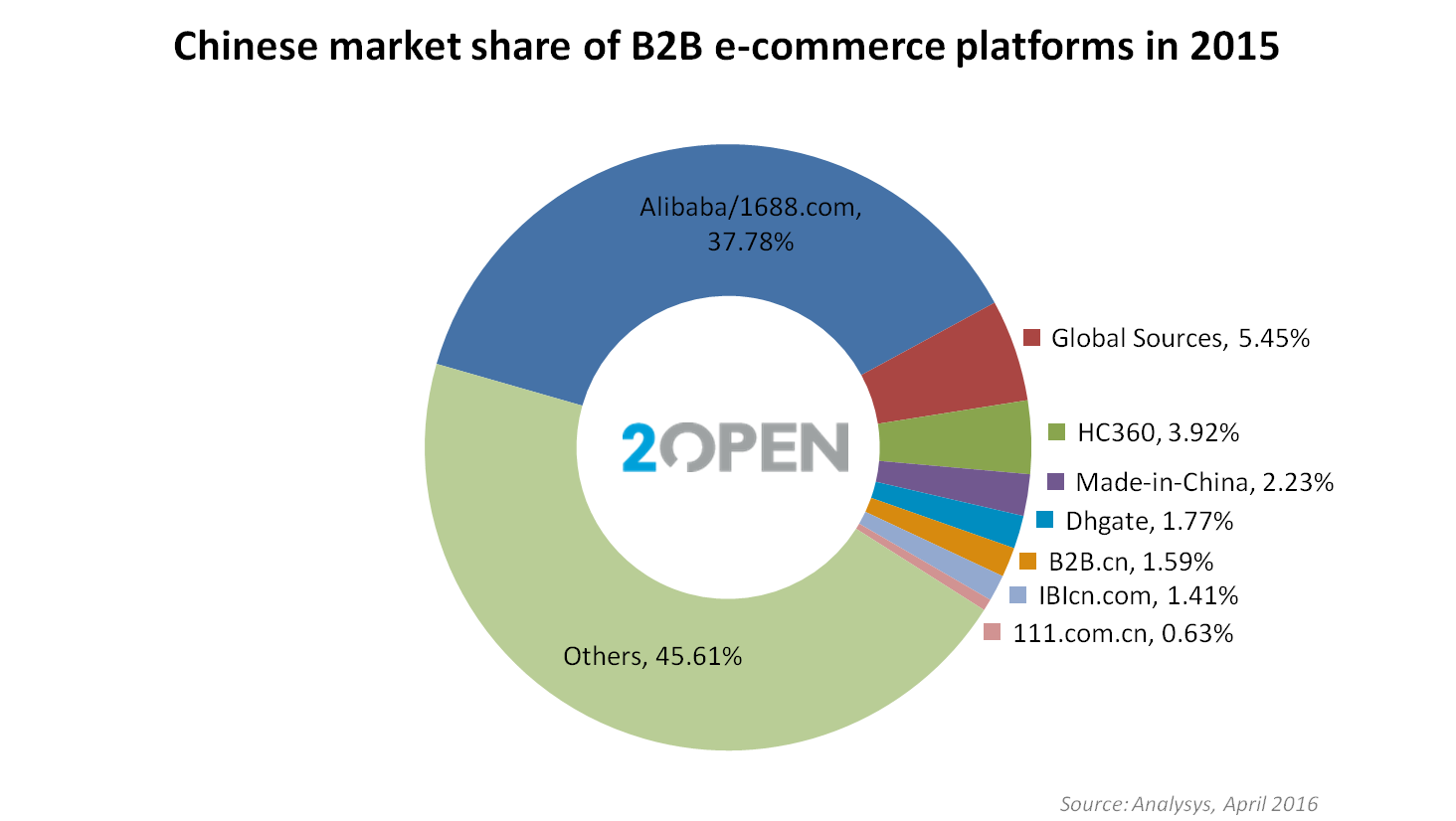Why China E-commerce Goes So Fast?
All of us are very well aware of the magnitude of the Chinese online market and, although it is currently the largest Ecommerce market in the world, it is also the most changeable one.
From 2 Open, we want to enable your approach to China giving you some practical guidelines about the current state of Ecommerce in China.
Understanding what is happening in China needs time and a constant willingness to learn: sometimes its fast evolution makes it hard to follow the new trends, other times foreigners just find an incomplete analysis.
According to the analysis report done by Data Center of China Internet -from now on DCCI-, China has currently taken the first place as the greatest E-commerce country in the world, while the online shopping penetration rate of China is in the second place after United States.
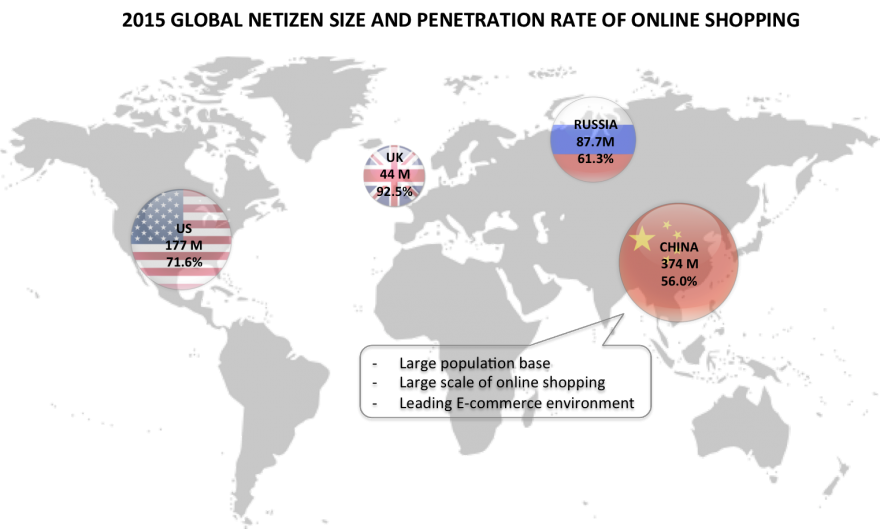
The result of China E-commerce indicates the Chinese economic keystone in recent years, also their development trend of commerce in the future.
As a result, in 2 Open we strongly believe there are more opportunities in the future for E-commerce development.
There are a range of factors we should take into consideration in our approach to the country:
E-commerce market is booming, due to the existence of multiple factors which stimulate the development
In 2015 in China, penetration rate of online shopping reached to 56%. This means there is a huge space to further development comparing with the most-developed countries, and a great opportunity to companies coming to China.
Although there are many factors which are promoting the trend, the main reasons can be summarized in a set of main points:
- Population: Until June 2015, China has 668 million netizens, 594 million mobile phone users and 374 million online shoppers. This leads us to a great size of online shoppers and a strong demand in domestic market.
- Policy: China and its Government have adapted many strategies and measures to promote the E-commerce development. It is a fact that the confluence of two forces have achieved incredible results in recent times.
- Technology: The mature E-commerce relating technologies facilitates the promotion of various industries, especially those related to the Big Data, Internet security, Online payment and Mobile technology. A niche market that is worthy.
- Enterprise: Internet companies have finally joined and distribute to the whole industry, so the result has been that most of the traditional E-commerce companies are transforming to the New Model. Thanks to it, the industry chains of BAT (Baidu, Alibaba, Tencent) cover a large area in China and it is expected to keep growing in future.
- Ecological Integration: The whole industry is getting into a mixture between online and offline industry. Take a look to Alibabas example: they have relied on the industry chain of E-commerce to integrate video, games, travel, finance and other fields into a complete unity. That is the future!
- Basic Infrastructure: Internet infrastructure develops rapidly, especially the Mobile Internet. But also 4G is changing the scene: in the end of July 2015, China 4G accumulated more than 250 million users and 4G base stations were over 1.53 million, of which the construction of TD-LTE base stations were over 1 million. Nowadays, 4G smart phone has already accounted for 82.7% of the domestic smartphone market and seems there is still a gap to fill.
Accommodating to the human-oriented strategy, the E-commerce marketing gets a standout result
With the diversification of E-commerce, the elements influence on the marketing result also became complicated, thus the marketing KPIs should be clear for the marketing themes and goals.
E-commerce marketing has changed from past into a new model of advertising, which is accommodated to the Internet users.
The Model of procedural purchase facilitates the result of advertising, optimizing the convention, and achieves 3 times of ROI:
- The user is the focus: Advertisement position of E-commerce marketing is transforming into human-oriented.
- Procedural purchase is pushing E-commerce marketing into OTG (On-The-Go) model.

Rapid growth of mobile terminal and Big Data brings more commercial values
Now in China Ecommerce market, users, marketing and advertisement investors are in favor of mobile terminal. With the development of mobile technology, the traditional business was greatly impacted.
¿The result? Big Data sharing connects user, product and service together; each data channel communicate with others can release a higher-value data stream.
Vigorously develop of the “festival event”
In recent years, the festival promotion has become an important way of arresting customers. Since November 2011, it has already turned into a battle for the Chinese leading E-commerce companies.
But also the advantage of big data sharing and innovated technology did a tremendous support in the precise marketing and advertisement.
Take Tmall as an example: in 2015, the turnover of Tmall reached ¥57.1 billion just in one day. A huge amount that can still increase.
The tremendous transformation that China lives, cannot be understood without experiencing it by firsthand.
From 2 Open, we have a global perspective and the expertise any company thinking on coming to China needs to develop its business in the country.
If you are looking to take advantage of Chinese Ecommerce, we will be happy to help you.
This article has been edited by Paula Vicuña, from 2 Open
Networking in China: Guanxi for Business
Have you ever heard about Guanxi?
This post seeks to provide practical guidelines to Companies on how to handle business interaction between Chinese and Foreign parties to ensure business agreements.
While doing a Market Research, Companies should be aware of some of the basic particularities which can condition their success or failure.
To develop an appropriate strategy of internationalization, it would be necessary to analyze some of the key-factors which can be decisive. Due to deep social differences among East and West, in China the importance of personal connections is crucial.
Major differences in negotiating with Chinese firms face many challenges which can eventually destroy a future profitable relationship.
Throughout this article we will make special mention of the term Guanxi.
Guanxi is essential for successfully doing business in China. The term is used to refer to a mutual trust between both parties, based on a long-lasting and reciprocal personal relationship.

Guanxi connections in China
There are some Chinese thinking patterns you should take into consideration before starting your business in the country:
- The importance of interpersonal relationships in business, terms specially related to hierarchy and reciprocity concepts.
- The effectiveness of moral over legal practices
- Prestige and public standing to guarantee the Face
In your approach to establish a networking, patience will be required in all the stages: to generate trust, to select the accurate network and to invest in a lasting relationship.
Why is Guanxi so important?
In China, economy is still strongly based on relationships. Trust remains the basis for economic transactions between Chinese people.
Therefore, Guanxi is a particularly valuable resource and becomes an essential facilitator of trade and economic transactions.
Three are the cornerstones on which to build Guanxi:
- A common social identity
- The existence of a third party in common
- A common aspiration of collaboration to create the potential bases for relationship
Chinese people do not show loyalty to the company, but to their personal relations
Networking can make the difference: eventually, right relationships will move your business faster in future.
But Guanxi also implies more traditional concepts to put it in practice:
- Mianzi: The care of positive prior appearances
- Renqing: Reciprocal favors as a moral obligation
- Ganqing: Emotional and enduring commitments that comes from the intimate social ties
The importance of an intermediary as a business enabler
Usually called Zhongjian Ren, the Intermediary deals with both parties to settle the differences in order to achieve a better solution to each problem.
Because Companies with best Guanxi win, having a proper Intermediary to represent your company can facilitate the business dealing and establish a successful business in Chinese market.
In search of Guanxi experience?
In 2 Open, we have the expertise you need to boost your Company to take advantage of the Asian market.
How to use Tencent Penguin Intelligence in your approach to the Chinese market?
Are you looking for the latest news of Tech innovation in China?
The goal of this article is to shed some lights of why Penguin Intelligence is a work-tool to keep in mind on your approach to China.
Penguin Intelligence is the official data platform from Tencent Technology
Tencent Research Organization works such as a professional organization which publishes in-depth reports about the Chinese mobile ecosystem.
Penguin Intelligence performs research and advocacy concerning hot-topics. It also studies markets, trends and best emerging practices.
Their work is founded on a rigorous thorough understanding of every Industry Focus, Sector Dynamics, Case Studies, Data Analysis and Macro environment.
Penguin Intelligence is constantly optimizing the analytical model
Penguin Intelligence is your best choice if you want to figure out what is happening in Chinese Internet Industry. Unfortunately, their business analysis and reports are only available in Chinese for the moment.
Penguin Intelligence also counts with three original sub-columns:
- Penguin Investigation
- Penguin Analysis
- Penguin Portfolio
In addition, Penguin Intelligence includes an Open Platform, which is a huge cohesion of all wisdom from China technological business.
What will you find in Penguin Intelligence?
As we have mention above, Penguin Intelligence contains a full variety of reports, infographics and data.
There are more than thirty valuable Business research reports, hundreds of in-depth analysis reports that have been already published and the Platform keeps growing every day.
The influence of these reports / studies has touched up multiple areas of Internet and traditional industries.
Due to its importance, Penguin Intelligence currently enjoys high reputation and credibility in Governments and Enterprises.
To illustrate the kind of searches which can be done, from 2 OPEN we have compiled a brief list of some of the most striking examples that you can find on the Platform:
- In-depth reports and fresh data about Tencent ecosystem; WeChat public accounts: What type of articles get the most attention from readers?
- Many infographics and graphs about mobile ecosystem in China; iPhoneS sales in China
- Data about digital marketing customer behavior; Do customers prefer hongbao or discounts?
Relying on Tencent, Penguin Intelligence contains a large user base and massive data advantage of products in multiple fields:
- Social networking application: WeChat (Most-used application in China)
- Social networking service: Qzone, Tencent microblog, Tencent Video
- Instant messengers: QQ, QQ International
- Online payment system: TenPay (which is similar to Paypal)
- Cloud storage service: Tencent Weiyun
- Own search engine: Soso.com
- Media player: QQ player, QQ Music, KuGou Music, KuWo Music
- C2C auction site: paipai.com (now merged with JD.com)

The huge scale of Tencent Data is the cornerstone of Penguin Intelligence ability to mine and analyze data, and serving professional market insights and industry reports.
Do you want to discover a little more of Penguin Intelligence?
As a Digital Marketing and Sales Agency, from 2 OPEN we often suggest you to contact us for a deeper understanding of all knowledge Penguin hosts.
Do not forget to subscribe to our Newsletter to receive some special information about China!
This article has been edited by Paula Vicuña from 2 Open.
Tencent and JD Launch Targeted Brand Advertising on WeChat
From the association of Tencent –owner of the biggest social platforms in China- and JD.com –the leading online direct sales company in the country-, has emerged a new conception of Marketing and Brand Advertising.
In 2016 in Beijing, both released a plan based on Ecommerce marketing service called “J&T Plan”.
The new policy was aimed to provide a tool to accurate a better portrait of the potential user, and improve the interaction with the consumer.
As a result, users data has become extremely valuable for any company:
Knowledge is power, more than ever.
What are their main Goals?
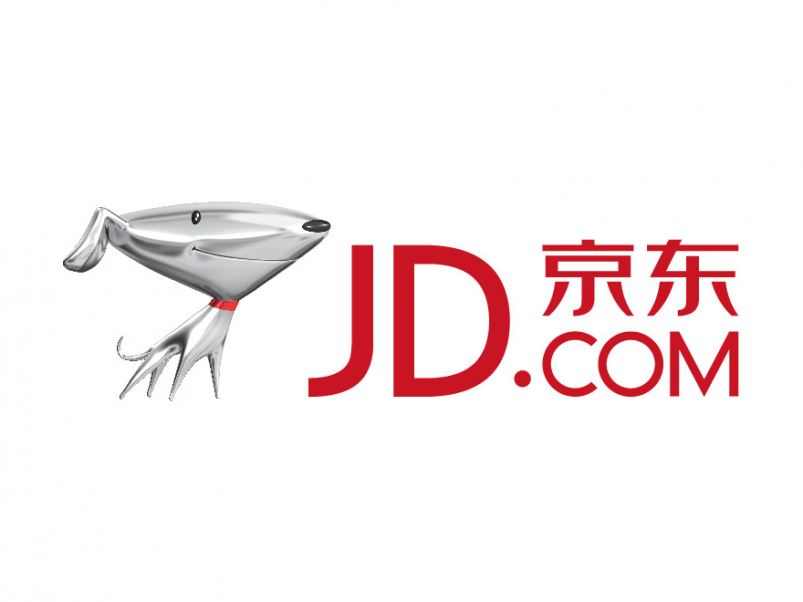
The aspiration of Tencent and JD.com partnership has been to provide a pleasant and high quality service to their users.
To reach its purpose, they have focused on three main objectives to strength its business on mobile and Internet, such as:
- Mobile access points
- Traffic support
- Ecommerce activities
Their desire to turn the user into the protagonist of the new Marketing, has launched a new approach based on three main ideas:
- Multi-dimensional user insight
- Effectiveness analysis
- Precision target audience
What do they want in Return?

Not only a commitment to the future and an advantage over its competitors, their relationship also give them some specific advantages:
JD.com obtains a stake in Yixun, PaiPai C2C marketplace businesses, logistics personnel and assets and QQ Wanggou B2C.
On the other hand, Tencent will offer level one access points in Weixin and Mobile QQ and support from other key platforms to JD.com.
In order to provide a better online shopping experience, they will also work together on providing solutions to online payment services and an overall digital marketing solutions.
If you are thinking on improving your company services, before starting a Business and Marketing Plan you should take in consideration some basic recomendations:
Build a well-aimed portrait of the users, improve brand experience with the client, and enhance technological tools to achieve it, have become the three key factors to consider on any approach to potential customers, and the best guarantee for the future of your company.
From 2 OPEN we have conformed a team capable of responding to new challenges and specialized on Business Intelligence. We can help you to deal with the new Marketing and Ecommerce trends.
Come with us. Together we will reach your company goals.
This article was edited by Paula Vicuña from 2 OPEN.
How will the “Brexit” influence China?
“It could be the darkest day in the history of European stock market.”
“Brexit”, the abbreviation of “British exit” that mirrors the term “Grexit”. “Grexit” was created when Greece tried to exit the European Union but failed at last. And now, the Britain makes it.
“In current phase, we are not able to realize the result (of Britain leaving the EU). But definitely, the uncertainty brought by the vote result is an enormous challenge.” The CEO of Deutsche Bank, John Cryan said.
Although from the earlier public opinion polls, the financial market held a positive attitude towards the referendum, the final result really touches off a huge earthquake among the global market.
“This result will absolutely be a huge blow towards the process of European Integration!” the Chancellor of Germany, Angela Dorothea Merkel said this afternoon.
The European stock markets nosedived at the opening, especially the bank board. In the opening today, the German stock market decreased almost 10%; the British fell by 9%; the French decreased 11%; the Spanish dived 17%. The Portugal Stock Index 20 fell by 9% and touched the lowest level since 1996. And the FTSE 300 even recorded the biggest day slide on record.

The indexes in Europe jold
Also, as the final result was announced to public, the British Prime Minister, David William Donald Cameron, declared that he will resign his position in October. “I will do everything I can in future to help this great country succeed.”; “I think the country requires fresh leadership. I do not think I can be the captain to take the country to its next destination.”
We respect the final choice made by British citizens for the European issue referendum
8153km, this is the distance from London to Beijing as the cross flies. How would the final result of this referendum influence China? What are the reflections of the Chinese?
The Chinese Ministry of Foreign Affairs said that the Chinese government and the citizens would respect the choices of British citizens towards this referendum. “China has consistently developed its relations with the UK and the EU from a strategic height and a long-term respective” Hua Chunying, spokesperson of China’s Ministry of Foreign Affairs, said this afternoon.
“China supports Europe in choosing its own way of development.” she stated, emphasizing that a prosperous and stable Europe is in the interests of all sides.
“China hopes the UK and the EU could soon reach an agreement on Britain’s exit“, Hua added.
And from the social media platforms (mainly Weibo), the citizens hold mainly 2 different opinions towards the final result
– “The Brexit is an absolute bull for China, it’s a God-given opportunity.” Dan Bin, the CEO of the Shenzhen East Haven Investment Management Co. Ltd posted on Weibo showing a POSITIVE ATTITUDE:
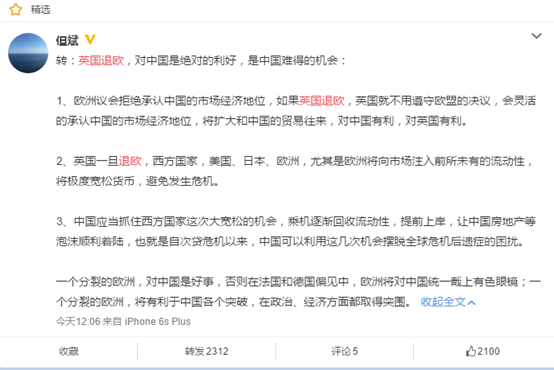
Dan Bin original Weibo post
“1. The European Parliament will refuse to recognize China’s market economy status. If Britain exits the European Union, Britain will no longer need to observe the resolution decided by EU. It can flexibly recognize China’s status and expand the trades with China. This is fruitful for both China and Britain.
2. Once Britain exits the EU, the western countries such as U.s, Japan, Europe, especially the Europe will inject unparalleled liquidity into the market. They will extremely loose the currency to avoid any crisis.
3. China should catch this opportunity to take back the liquidity, to go ashore and land the bubble of the Chinese real estate successfully. China can use this opportunity to get off the perplex from the sequel of the global financial crisis.”
In this comment, the publisher thinks that this is an opportunity for China to recuperate the domestic finance and expand the trades with Britain. He also says that this is a good thing to China, since the Europe always recognize China with prejudice due to France and Germany. A broken Europe will be benefit for China to seek for sally ports, in both politics and finance.
– But also, there are other voices that, once again, even being positive, are also MORE RATIONAL. From the comment of Ifeng news, there are 6 main effects towards China:
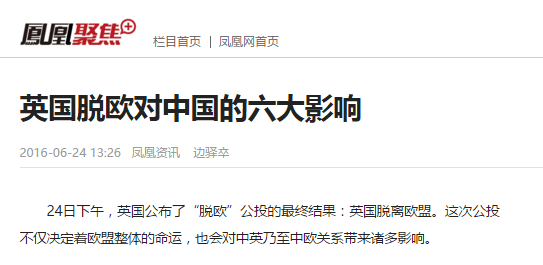
Ifeng comments on their website that have been forwarded through Weibo
“1. The students studying in Britain can save tens of thousands of dollars
If UK exits the EU, the exchange rate of Pound will crash. Thus, for people to study or travel in UK, it would be a bull. Citigroup estimates, if the British exits the European Union, the exchange rate between Pounds and U.S. dollar will fall by 10% to 20%. For the UK students, the one-year tuition would be 1.5 million pounds and living expenses would be 10000 pounds. Thus, they may save 2.4- 4.8 million yuan per year.
2. The devaluation pressure of China Yuan increases
If UK exits the EU, the exchange rate of Pound will crash. Although, for people to study or travel in UK, it would be a bull, for the short term foreign exchange market, the depreciation of sterling will lead to the appreciation of the dollar, and will cause the devaluation of the China Yuan towards the US dollar.
Economists said Britain’s leaving could make the financial market panic, leading to the capital outflows in mainland China, increasing the devaluation pressure, and challenging the monetary policy management of the central bank.
3. Yuan’s internationalization step will be disrupted
London has become the second largest offshore settlement center of China Yuan after Hong Kong. However, once the UK exits the European Union, the currency bonus will disappear. And the costs of strategy promotion in EU by Britain will also increase significantly. Chinese financial institutions need to consider dispersions to Paris, Frankfurt, Luxembourg and other places. This action will cost price.
4. Sino-EU trade cooperation will face a change
Some analysts believe that the economic impact of the British leaving EU may affect China ‘s exports, especially once the EU tend to adopt trade protectionist policies. Then, it will affect bilateral trade.
Once the UK exits the European Union successfully, the process to strengthen the strategic cooperation plans with the EU by the British will become difficult. The left is tantamount to breaking the invisible indirect cooperative ties between China and the EU, so that China had to choose other ways to press on with cooperation, and the impact from the various pre-bidding trade policies is also likely to be greatly reduced and become huge sunk costs .
5. No more ” the channel into Europe ” for Chinese enterprises
China has 500 million potential customers in the European market, however, due to protectionism, Chinese enterprises are often turned away. Britain is regarded as the most active countries within the EU which advocates free trade and investment liberalization. Thus, many Chinese companies will select the British as their production bases in Europe. And London will be recognized as a ” passage to Europe”. If Britain left the EU, may arise between the EU, the potential trade barriers between Britain and Europe will reduce the willingness of these enterprises to produce in UK. Some companies may choose to move to Brussels or Dublin, which are the areas have convenient and free market within the European Union.
6. Chinese people will be on the window period for overseas house purchasing
In recent months, international investors’ enthusiasm for commercial real estate investments in UK decreased significantly, while the sentiment increased. Some industry insiders predicted that once the United Kingdom exits the EU, the house prices in UK will fall down. When coupled with the depreciation of sterling, it will further promote the real estate market volatility, which would be an excellent “window period” for Chinese investors. Some industry insiders said that since the supply and demand relationship is still the main determinant of UK property currently, the UK house prices are still optimistic within the next five years and expected to increase about 25%. This would be more profitable for investors focusing on long-term profit.”
our conclusion
Although the SSE (Shanghai Stock Exchange) composite index fell by 1% when closed, the Chinese citizens and market now are still having a positive attitude towards this result. As per the Chinese, as what we mentioned before, they respect the choices of the British, and also their democratic rights, or at least that is what we could see on the digital walled garden build within China.
How to Sell B2B Online in China
Last week we were in an event in Valencia organized by our partner, the Valencia Chamber of Commerce, in which we shared our knowledge about the B2B online business development in China in front of a full auditorium.

We were glad to share the “stage” with 2 of our best clients:
– Amvos Consulting: leading digital marketing agency in Europe and South America
– SoloStocks: best B2B online platform in Spain currently present in over 12 countries in Europe and South America
And that is what we talked about:
– WHICH ARE THE MAIN ONLINE B2B PLATFORMS IN CHINA?
As we can see in the top image chart, the clear winner in the B2B Chinese market is Alibaba with its domestic platform 1688.com which absorbs 37.78% of the market share as per April 2016, followed far behind by Global Sources (5.45%), HC360 (3.92%), Made-in-China (2.23%) and DHGate (1.77%).
– Alibaba.com/1688.com: Alibaba.com is the leading platform for cross-border wholesale trade, serving millions of buyers and suppliers around the globe and 1688.com is the main B2B marketplace for domestic China trade among small and medium enterprises.
– Global Sources: It is a leading B2B media company and a primary facilitator of trade with Greater China. More than 1 million international buyers, including 95 of the world’s top 100 retailers, use these services to obtain product and company information to help them source more profitably from overseas supply markets and generate sales leads and win orders from buyers in more than 240 countries and territories.
– HC360: is the third most important domestic B2B e-commerce operator in the People’s Republic of China. With its professional information services and advanced internet technologies, it has established a reliable demand and supply platform for SMEs, and has been providing them with complete business solutions over the past 22 year.
– Made-in-China: was developed and is operated by Focus Technology Co., Ltd. Focus Technology, is a world leading B2B portal, specializing in bridging the gap between global buyers and quality Chinese suppliers.
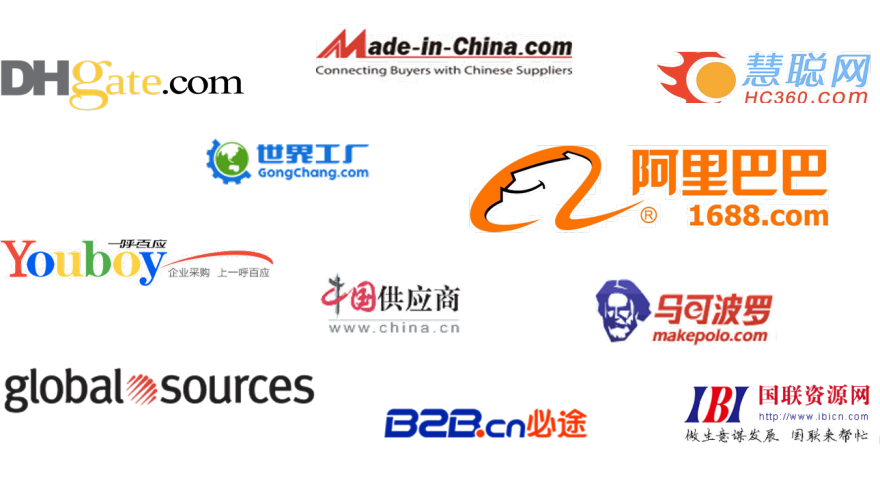
Since China’s policy of reform and economic openness, the B2B traditional model unlocked unprecedented levels of growth and development. With the Internet booming and the transition of trade models taking place, most industries have enrolled in the online B2B revolution to develop their brand. For this reason, hundreds and hundreds of new B2B platforms are born trying to differentiate from each other and creating that way an unparalleled war. And we see new attempts to get to the top of this pyramid, day in and day out, as they all want to get a piece of the huge cake.
– BUT, WITH SO MANY OPTIONS… HOW CAN I CHOOSE THE RIGHT PLATFORM?
We list for you the key factors that should be taken into account in order to select the best platform for your brand to sell your products in a business-to-business model in China:
– Establishments costs: Lower implementation costs through simple installation and integration and unproblematic expansion options. The vast majority of wholesale online trading platforms in China are “free” to use. You can create your own shop and list your products. That way you have your own B2B storefront in China; but how will your products get noticed within the others? All these places provide different visibility packages. Call it gold member, golden supplier or whatever other name you can imagine; the important thing here is to compare these packages and what is exactly what they offer.
– Volume: What is the number of suppliers and competitors? What is the traffic volume generated in the platform? In this area, 1688.com is the clear winner from both sides. Anyway, there are also other vertical platforms that might be worth checking.
– Chinese partner: In order to create a shop and list your products in any Chinese domestic B2B platform, you will need to go hand in hand with a Chinese partner as you cannot use your foreign business licence to sell products within greater China. Here it appears the classic dilemma: Chinese partners are usually very opaque and don’t like to share any kind of information. 2 Open, as a Chinese and Spanish company, can be the right Chinese partner with modern European-style management and creates a totally transparent relationship with its customers. We want to succeed with you and not the other way around.
– Promotional tools: It is important to analyze which actions can be done in order to get more traffic to your shop. The most of them offer performance marketing actions in a CPC or CPM model, both for keyword optimization and display actions. The prices are usually high and a study should be done to assure that the ROI is the right one.
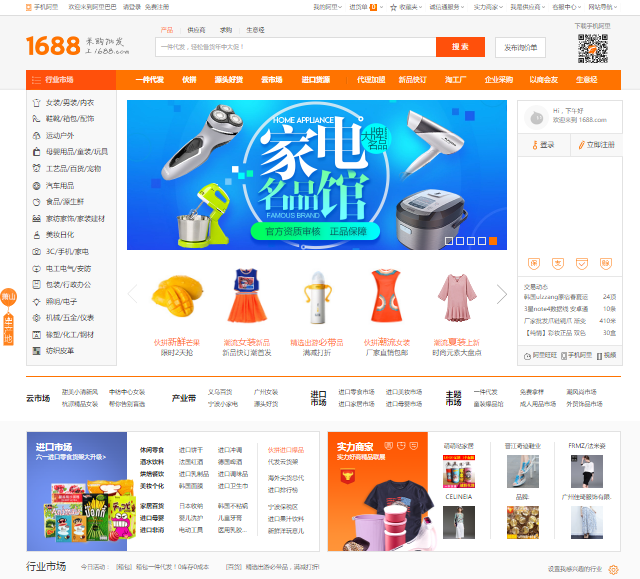
1688.com Homepage
In 2 Open, we usually recommend to do a market research that can lead us to take the best informed decisions: channel/s, range of prices, target audience, marketing budget and promotional efforts, potential return of investment, etc.
In another post we will show you how to optimize traffic within 1688.com to obtain more leads, so keep checking our blog and contact us if you have any questions. 2 Open can help you succeed in the Chinese B2B online world!
10 things you need to know to Build a Chinese Website (Part 1)
When planning to enter the Chinese market, one of the main points in every marketing plan should be the creation of a website that focuses on the Chinese consumer.
Naturally, there are some questions that come to mind…
- What are the differences between a western and an eastern website?
- What are the aspects that I have to keep in mind in order to trying to attract Chinese consumers?
- Would it be a good idea to just duplicate and translate my current content?
All of the above can be summarised in one question; what do I need to do in order to create a great website that will have the potential to reach the 675 million China internet users?
In this series of posts, we will try to give you some tips that will help you create a website for the Chinese market that will appeal to Chinese consumers and also match the style, tech and literary attributes of eastern consumers.
1 – Chinese Web Design – What the …???
When we look at a Chinese website, the first feeling we get is confusion… Language, structure, content … We can´t find anything similar to Western websites based (lately) on cleanliness and simplicity. Our China web design must be adapted not to our tastes, it must match Chinese consumer design taste.
If you have not navigated through Chinese websites maybe you don´t completrly understand what I mean. You´ll see easily the difference with these two examples. Taobao and Ebay, two B2C marketplaces (or C2C) from east and west.
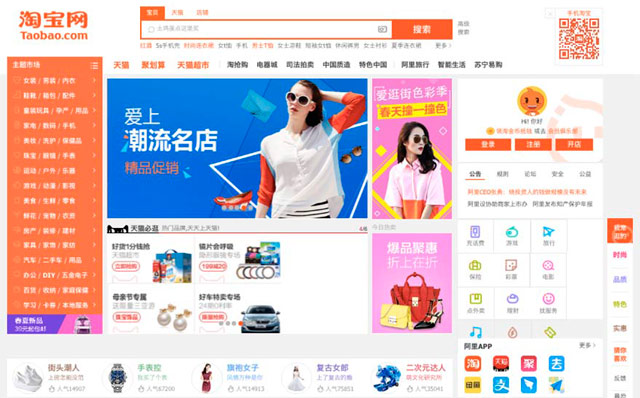
China Web Design Example – Taobao Home Page

Western Web Design Example – Ebay Home Page
Can you appreciate the difference in style, design, structure? I bet you do…
We can see a lot of information on Chinese site in contrast to the cleanliness and simplicity of the western site.
Our experience creating websites for the Chinese market has shown us some key points to understand and get advantage:
- Chinese websites use many more elements and are much more colorful than Western.
- Chinese language is different. It seems obvious… but there are things we have to consider about Chinese language such as:
- There is not a capital letter in Chinese
- There are no spaces between characters
- Chinese characters are far more dense than our letters
- Chinese sites use a lot of animation, flashing texts and banners. This is clearly the opposite to our western websites where movement is disappearing. The reason can be it’s much harder to grab attention using fonts in Chinese than it is with western languages.
2 – User experience… Do they have any good one?
We have just seen as websites in China seem much more complex than we are used to. We might think that the user experience will be a nightmare, but Chinese user is so accustomed to information under this structure as we are to the western structure.
Chinese user is concerned about usability and user experience, but is used to webpages so busy usually does not care how the site looks. However the trend is towards simplicity and clarity on web pages. In a more European style.
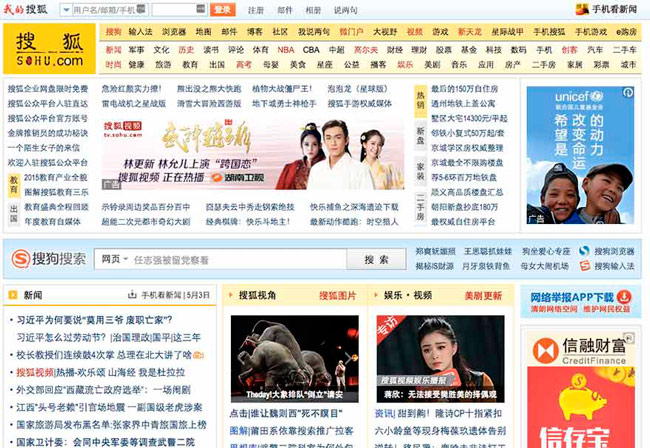
Where is (link) Wally?
Some of the highlights on Chinese websites regarding to navigation are:
- Chinese websites have a big number of links, however Chinese users do not like this system. This can be given by the low load speed internet in China.
- All this links use to open in other new windows. Why? Again it’s mainly an issue of speed. Internet access in China is generally slow, users have gotten used to opening new links while waiting for a page to load.
- Keyword search box as a navigate tool. Link system is not comfortable for users because they can be lost due to the big amount of links. For this reason, on Chinese websites keyword searches have to be really efficient, and the search bar must be top accessible.
3 – Hosting & ICP. DIstance matterS
The one who said that, in internet there is no distance, did not know about China. If you are not (legal and/or physical) in Mainland China, easy staff like finding the right hosting can became a little bit more complicated.
Let´s start from the beginning, one of the most common questions when we are going to create a China site is should we host our website within or outside China? Is there is a big difference? The answer is very clear, as far as possible we should try host the web in Chinese Mainland, and we will try to explain why.
China network structure is not the best, which makes the websites loading speed not the most appropriate. By hosting our web outside China this problem becomes much more serious.
Okay, so we are clear, we should host our website in China, now what? We must apply for a number of ICP (Internet Content Provider) to the Ministry of Industry and Information Technology of China. This is the ICP license that will allow our site to stay in Mainland China. Only companies with a physical presence in China can apply for this license (which usually see in the footer of the sites, as in our case).
For companies that do not have a legal entity in China, we do recommend looking for hosting solutions in Hong Kong, which can limit the problem of loading speed and make our site more accessible for the Chinese user.
Now that we talk about speed, even though the main problem affecting the same be the hosting (inside or outside) there are also other factors that can make our web go slower (and we have seen that it is a key point in China) as can be:
• Website images are not size optimized
• Poorly code in our website
• Low hosting quality (even inside Mainland China)
• Our site is using services blocked in China (Google Fonts, Google Maps, Twitter, Facebook, etc…) which prevents the page from loading
4 – Did you say… services blocked? … the Chinese Great Firewall
China not only has a huge physical walls to defend themselves (in the past). China also has a large digital wall, the Great Firewall. Originally known “Golden Shield Project” but ironically nicknamed Great Firewall, it is a censorship and surveillance project initiated by the Chinese Ministry of Public Security in 2003.
This project acts as a digital censor and block all websites that do not meet the content requirements that marks the Chinese government.
Here you can see some more information about how the censorship works.
Among other things, Chinese Internet censorship censored webpages that have content that include; news sources cover topics considered that are defamatory against China: such as police brutality, Tiananmen Square protests of 1989, freedom of speech, Taiwan Government, Dalai Lama or the Tibet Independence Movement International …
These sites are banned or are indexed to a lesser degree, if at all, by some Chinese search engines and have significant impact on search results.
As a result of this control in China they are blocked pages as usual for us as Google, Twitter or Facebook (it does no matter how much Mark go jogging in Tiananmen). Although great firewall control is easy to jump (using a VPN, for example) the difficulty of accessing these pages has made their use and popularity is low.
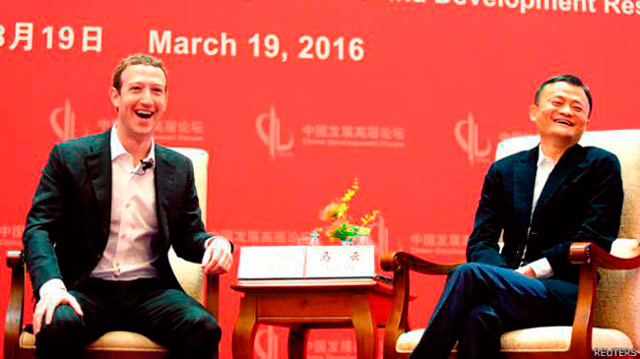
Stop laughing Mark. It´s not gonna happen
This means we need to be very careful with our website content, try to be sure to avoid Great Firewall content restrictions and not to use third party banned platforms like Google (Google Maps, Google Fonts), Facebook or Twitter.
5 – New Players & New Rules
So, no Facebook or twitter, how am I going to promote my website? China has a digital ecosystem different of everything we are use to. Surely you’re wondering how you survive without some of the usual promotional tools. Natural positioning in Google, PPC Adwords campaigns, promotion of content on social networks like Facebook or Twitter …
In China you will find new players who have occupied these gaps and in some cases, created new niches. These new players have taken advantage of the absence of foreign competition (Facebook, Google …), its adaptation to Chinese culture and peculiarity and in some cases even a strong government support.
These actors we found some “copycat“, certified copies of known systems, such as:
- Baidu, the Chinese search engine par excellence (suspiciously similar to Google)
- Weibo, the microblogging service (suspiiiiciouuusssslyyy similar to Twitter)
- Youku, video service (guess who it is similar?)
We also have WeChat, the jewel of the crown and the mobile app (almost an OS) that includes messaging, payments, calls, moments … and which we discussed in detail in another post.
For our website to be inside China digital life it must be adapted to the rules of these actors, common in the dailylife of the Chinese consumer.
So, who are the big guys that you need to be friend of?
As soldiers in a war, most of these tools fall into three large “armies”. These three groups are known as the BAT and are in constant battle to dominate the Chinese digital ecosystem.
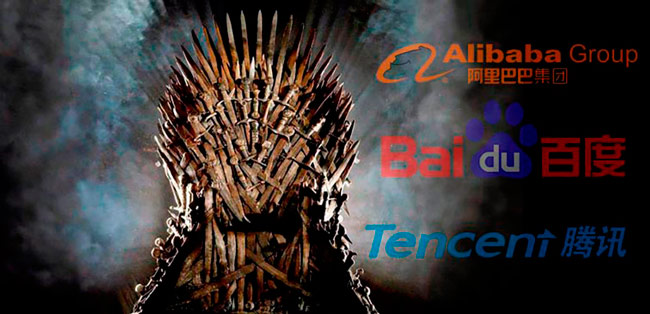
Who is going to win this war?
In short, Baidu holds commanding market share over search. Alibaba holds to the same power over e-commerce. Tencent is the dominant player in social media. But they are constantly trying to invade their territory, in a very interesting war for any fan marketing.
One of the commonalities of the BAT is a full support of the government, together with its dominant position in the market, makes this status quo is difficult to change.
What does it means for our website? We need to adapt our communication to this new players, generating our social media activity through Wechat, optimizing our SEO for Baidu or 360, uploading our videos in Youku, adding sharing actions in our content with Chinese social platforms… anything we use to do in our occidental site does not help us here and can be even negative for our goals. As we have seen, if we keep on using tools like Facebook (post sharing options for example) we can be blocked by the Great Firewall.
Do you want to know more? Sure? CHECK THE SECOND PART OF THIS POST HERE
References:
http://www.china-briefing.com/news/2015/05/22/best-practices-launching-china-website.html
https://econsultancy.com/blog/67466-why-do-chinese-websites-look-so-busy/
http://www.latmultilingual.com/build-localized-chinese-website/
Sources:
http://www.freepik.com/free-vector/screen-with-a-website-and-icons_847180.htm
http://www.freepik.es/vector-gratis/trabajador-llorando_834598.htm
L’Oreal Digital Marketing Campaign in China
In the first half of 2015, L’Oreal’s financial statement reported revenues of 12.82 billion euros worldwide. In comparison with 2014, there was an increase of 14.7%, which is the fastest growth that the company has had in the past 20 years. Its digital marketing campaign was not the exception, with an outstanding 40% increase in online sales, exceeding 1 billion euros; it represented 5% of the company’s total turnover strengthening its position in the online market.
Nowadays, in the cosmetic & beauty industry, 70% of customers search products online before they actually buy them, which means that social media must play a big role in this. Why? You might be wondering, well, the importance of knowing consumer’s needs and preferences enables companies to come up with tailored ads and maximize their marketing budget. Many industries have transitioned from the classic marketing model into its modern version to further understand consumers and optimize results.
It seems that the upcoming era is digital, the society now is constantly connected with their mobile phones, and people are interacting on social media all the time. Most Chinese people love to share moments of their daily life via Weibo or Wechat, these social mobile applications gather a lot of Chinese young people who are potential online buyers, this is one of the main reasons why this new consumption model results so profitable.
Taking all of this into account, L’Oreal, the global beauty brand, keeps track of trends and maintains strong competence in the Chinese online market. The business credo for the marketing industry “where are the consumers, where are we” is practiced well by L’Oreal. In fact, in the digital marketing revolution, L’Oreal is not only expanding its e-commerce channels, they also apply a complete strategy to digital marketing.
All the product and services have to be digitalized
For instance, on the CES conference in Las Vegas, L’Oreal released a patch for sun-induced skin damage – My UV Patch, helps users track real-time ultraviolet exposure damage on the skin with the help of an App. In addition, L’Oreal has also launched a mobile App called Makeup Genius. The App can help users find their own appropriate makeup. Most Chinese people are shy and they do not dare to try exaggerated makeup, with this App users can try hundreds of makeup options and share on various social platforms. In the future, L’Oreal will try to launch more service-oriented App.

-L’Oreal APP for IOS
Digital involvement into every step of decision-making
In the buying decision process, customers experience 4 steps: identifying, considering, purchasing, and sharing. L’Oreal gets involved in every step of the process. For brand awareness, they launched a video advertisement on the entire media platform of Weibo and Wechat. For the decision-making stage they issued a series of makeup tutorial videos on Youku and finally let the users use social media to share their purchasing experience. With this, the entire consumer decision-making process is digitized.
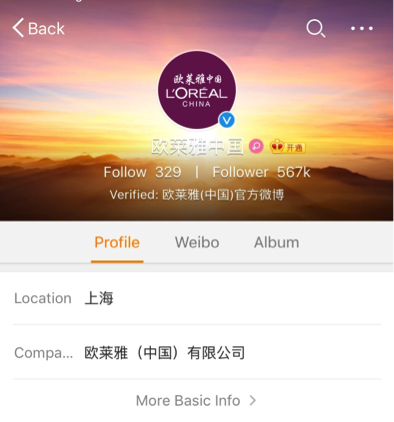
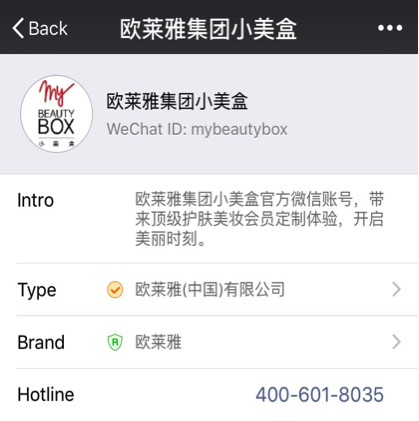
-L’Oreal official account on Weibo and Wechat
Take this case for example, in the 2015 Cannes Film Festival; L’Oreal launched a video advertisement on Wechat, where L’Oreal’s stars would post their pictures and voice message saying “I am in Cannes, will you come? ” and a link to L’Oreal’s e-commerce page. Through this event L’Oreal attracted a lot of fans and potential customers, and the brand’s social influence was digitalized.

-L’Oreal Cannes Event on Wechat
All brands on digital platforms
Based on the first two points, L’Oreal Group including Lancome, Maybelline, L’Oreal Paris and other brands, try to position themselves, as much as possible, on various digital platforms, that is, “where are the consumers, where are we”. Since, nowadays, almost all of the customers are online, L’Oreal has to be searched and discussed as much as possible by customers in order to gain more popularity in the digital world.
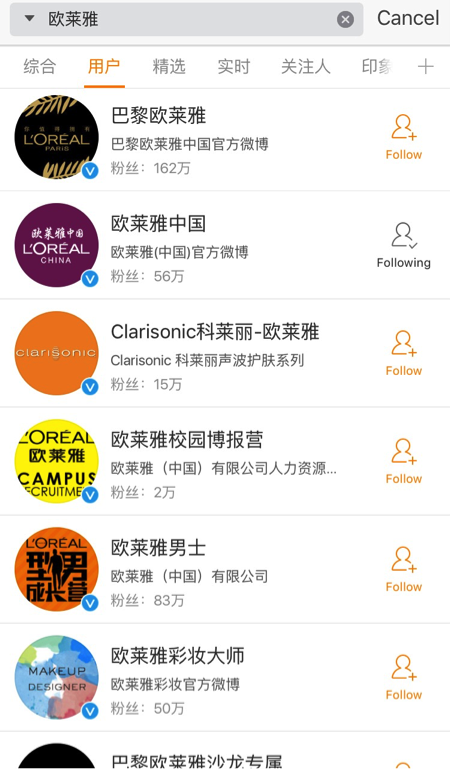
-L’Oreal brands on Weibo
When analyzing L’Oreal’s digital marketing strategy, it is worth noticing that this giant enterprise takes digital marketing as a key element of responding to the rising demand among beauty consumers. The O2O (online-to-offline) model gradually drives the enterprise transforming it into a new business model. Digital marketing could not only develop a new market but also help to create a new CRM (Customer Relationship Management) system for other companies. We believe in the future and Chinese digital marketing will become more and more important in the following years.
Have you learned Chinese yet?
If you have any questions or require any information about our services, please do not hesitate in contacting us, our group of specialists will happily assist you.
This article was edited by Andres Arroyo Olson from 2Open.
2016 Springtime At The Canton Fair
The Canton Fair, held since 1957 in the city of Guangzhou, is currently the largest International Trade gathering in China, and the most successful one in the country. In Spring and Autumn, and for fifteen days, the city brings together importers and exporters from all over the world.
Its 2016 Spring celebration, divided into three sessions of five days each, aims to meet the demands of any business person: Electronics and Household Electrical Appliances; Lighting Equipment; Vehicles and Spare Parts; Machinery, Hardware and Tools; Building Materials; Chemical Products, Energy Resources; Consumer Goods; Gifts; Home Decorations; Textiles and Garments; Shoes; Office Supplies, Cases and Bags; Recreation Products; Medicines, Medical Devices and Health Products; and also Food.
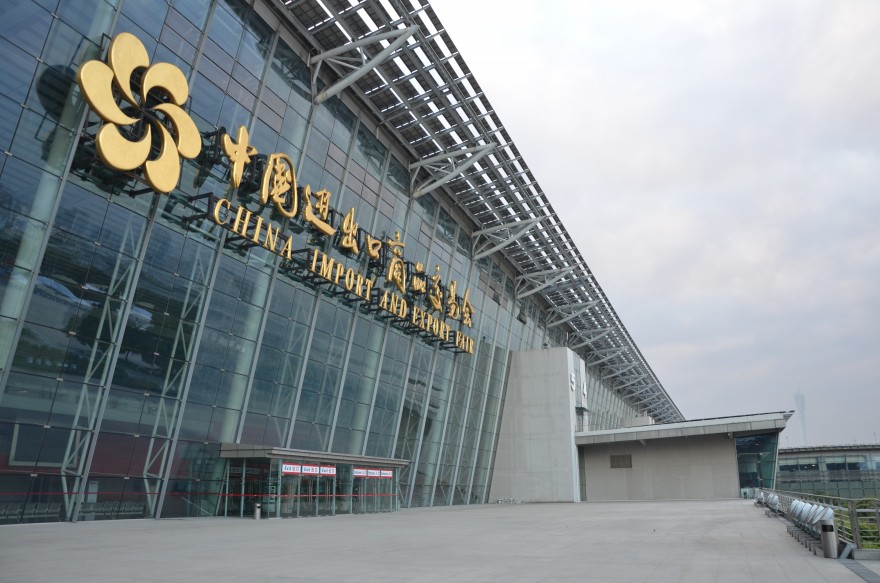 But why exactly is this event so appealing?
But why exactly is this event so appealing?
Well, with 15,000 manufacturers and fabricants, and over 60,000 stands, it’s not a surprise that it has gained such popularity, besides, its ability to accommodate all of them and generate new trade flows makes it the largest fair in China, and probably in Asia.
Those who attend The Canton Fair can find answers to all of their business needs: economic, technical and human cooperation; logistics, transportation and distribution; insurance and commodity inspection; advertising, public relations and contacts with some of the most buoyant businesses today, you name it.
Its attractiveness is also equal to its capacity to generate wealth among its members: only in 2015, commercial exchanges reached 55.066 million USD.
Who attends to the Canton Fair?
Despite the uncertainty in the global economy and after a slight decline in the last two years, 2016 has been considered a good year to participate in the Canton fair. With more than 24,000 companies confirmed, optimism among the organizers and participants has returned to stay and strengthen the fair’s position as an already global event.
Although the event’s main target group were Asian buyers, in recent years, the presence of Westerners has grown significantly becoming a meeting of international nature in which the presence of developing regions such as India, Latin America and Africa has also increased. Curiously enough, the presence of participants from Hong Kong and Taiwan has been reduced each year.
What are the benefits of the Canton Fair?
Firstly, the continuous and growing exchange of goods between participant countries facilitates the development of the Chinese trade, and consequently, strengthens the Chinese economy.
Secondly, the Canton Fair celebration generates high-level synergies, not only among the participants but also among outside companies. The fair generates quality information on the future of the economy, the most demanded products, leading companies and, goods and services.
Finally, due to its attraction capacity and longevity, the fair has contributed to develop a wide range of alternatives for visiting and enjoying the tour: visas, tickets, hotels and translators are easy to obtain through specialised agencies.

2Open attends every year to both the Autumn and Spring Canton Fairs, being up to date with what is happening in China is a challenge even for our dedicated team who are constantly on the scout for new trends in the industry. We strongly advice anyone who is intending to engage in any business related activities with China to attend this event, it is a great opportunity to grow any business, however, if you want to really turn your business around you should contact 2Open.
Our goal is to understand our clients business needs in order to provide the best possible services. If you have any questions or require any information about our services, please do not hesitate in contacting us, our group of specialists will happily assist you.
This article was edited by Andres Arroyo Olson from 2Open.
Big Data and Precise Marketing – Tips from Baidu
Nowadays everyone is talking about big data, but what exactly is big data? How can we use it to benefit our business in China?
As we all know, Baidu is the biggest, and most popular, Chinese search engine with coverage of approximately 95% of China’s population. It receives around 6 billion search queries per day. With their countless backstage data, Baidu decided to move forward into the big data area and try to convert it into a high-value business service.
Last week 2Open attended a seminar about Baidu’s big data and precision marketing. Here are some point that were discussed during the event.
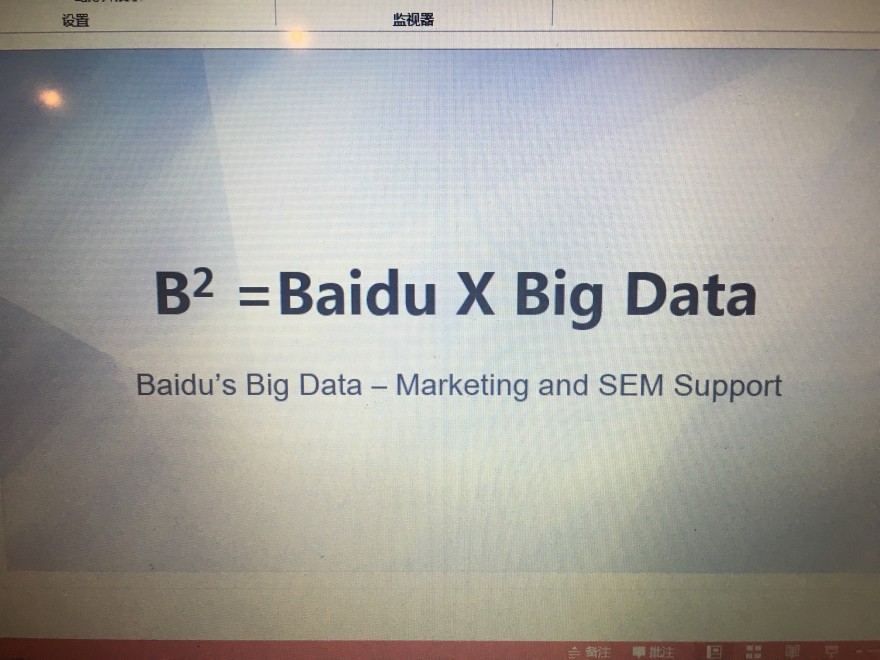
What is big data?
Big data is all about predictions, math applied to large quantities of data in order to infer probabilities. The big data will provide us with the new ability to crunch a vast collection of information, analyze it instantly, and draw conclusions from it.
Big data can be used in a variety of business field: cross marketing, precision marketing, reference location, credit investigation, quantity investigation, disease prediction and travel prediction etc.
For instance, by using Baidu’s big data, we can find out the crowdedness of certain touristic attractions and the popularity of the travel itinerary in China. With the help of this data we would be able to improve our travel plans since we would be avoiding crowded destinations.
Big data for marketing?
In the past Baidu cooperated with a motor company (to protect the advertiser’s rights we will refer to this company as Company A).
First of all, Company A wanted to launch a new A0 level car to the market, but they had no idea what the new car’s selling point was, more importantly, how to handle the pre-marketing and publication campaign. They decided to work with Baidu and used their big data service.
Secondly, Baidu identified consumer’s emotional needs by mining social data, and exploring differentiation opportunities by scanning the perception of other competitors. With all of this data they decided to use “happiness” as the communication concept/selling point of the new car.
Finally, by studying consumer’s profiles, identifying target audiences, and understanding different age groups by analysing their lifestyle and engagement occasions. The new car’s main target audience resulted to be 23-45 males, in tier3, tier4 and tier5 instead of tier1 and tier2 cities. This turned out to be the most important consumption market.
For lifestyle occasions, Baidu chose readings, videos, movies, TV series and gaming as the main five labels for determining their target audience. Company A even designed a LOL (League Of Legends, one of the most famous online games) poster ads.
For engagement occasions, there are five stages before the final purchase. Baidu defines them as; category research, comparative study, trial, finding 4S stores, and financial plan. Then they give related suggestion to company A for every stage of the marketing strategy.

Baidu named its big data & marketing decision platform “Sinan”(http://sinan.Baidu.com/). This platform mainly provides nine functions: audience definition, brand recognition, interest insight, search behaviour, demographics, geographic, media preferences, multiple data merge, and media buying suggestion. With the help of a big data platform like this any marketing strategy will be much easier for a company.
Still wondering about how to improve your business in China? Try embracing big data now! Or… get in touch with us. Here at 2Open we are passionate about every project. Our team of specialists have the expertise and knowledge that your company needs to thrive in the Chinese market. If you have any questions or require any information about our services, please do not hesitate in contacting us, we will be more than happy to assist you.
This article was edited by Andres Arroyo Olson from 2Open.







